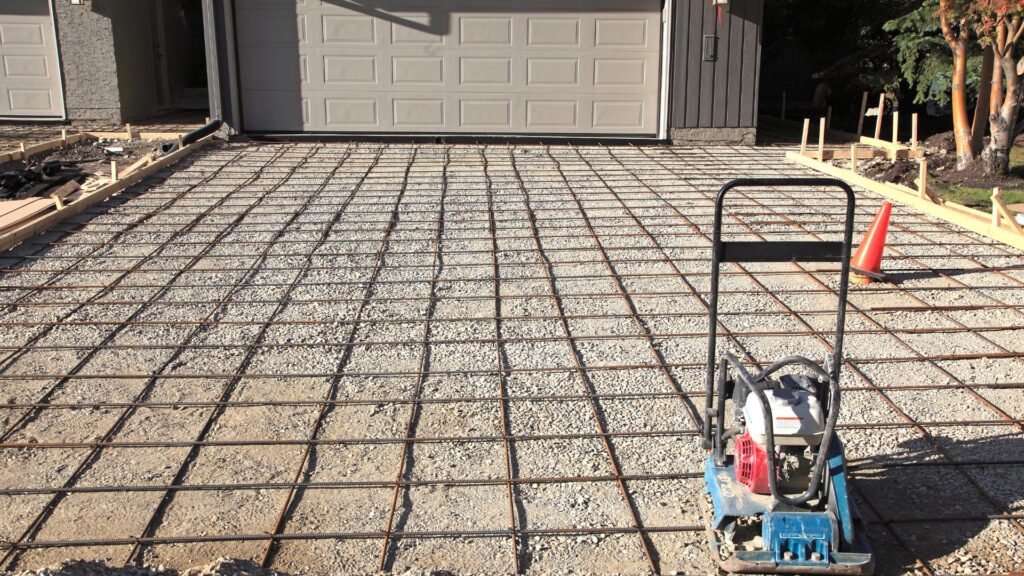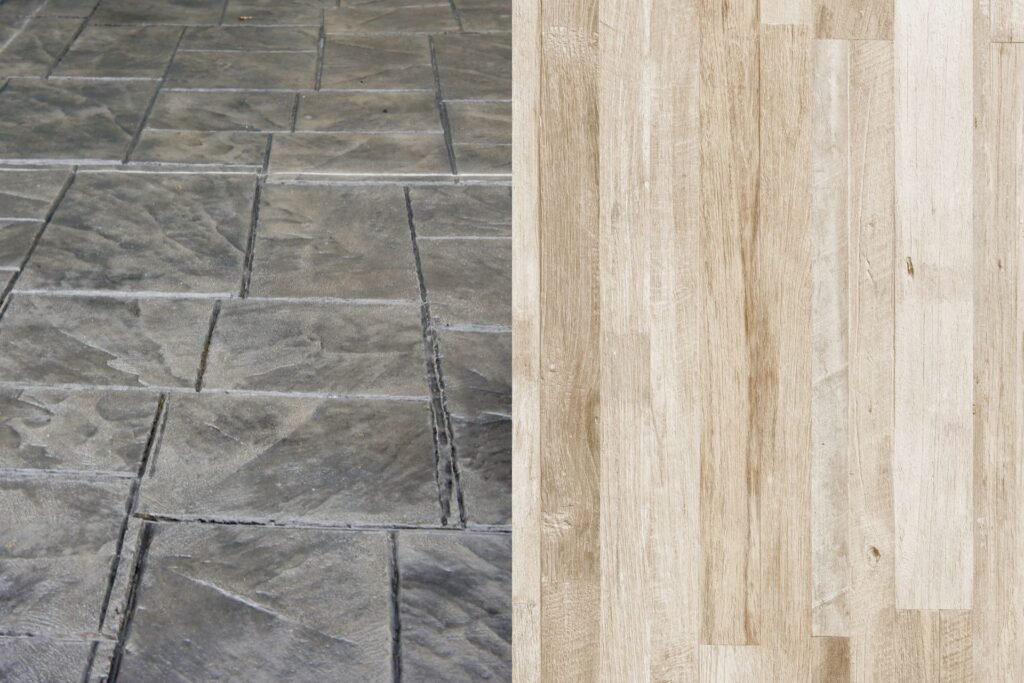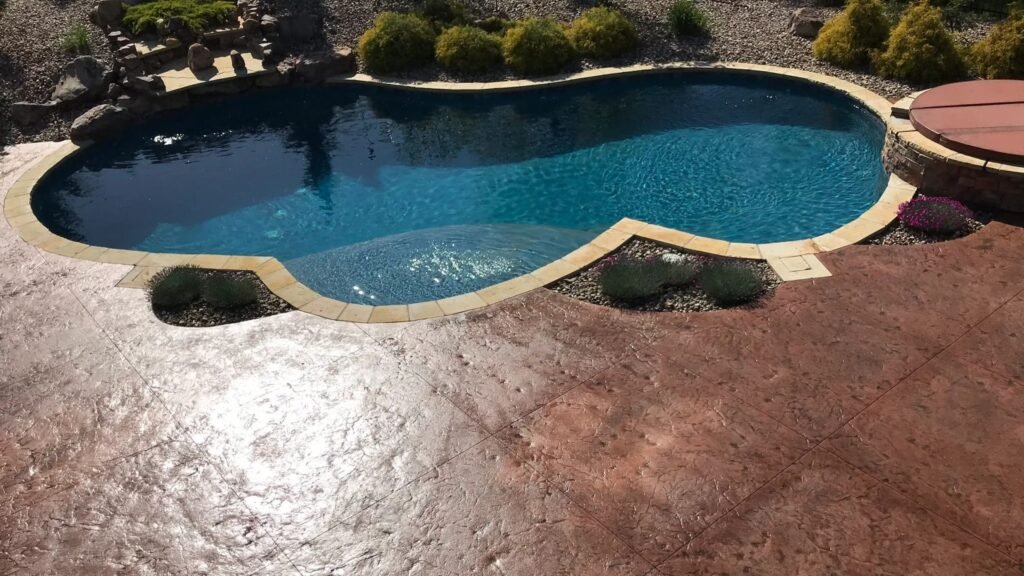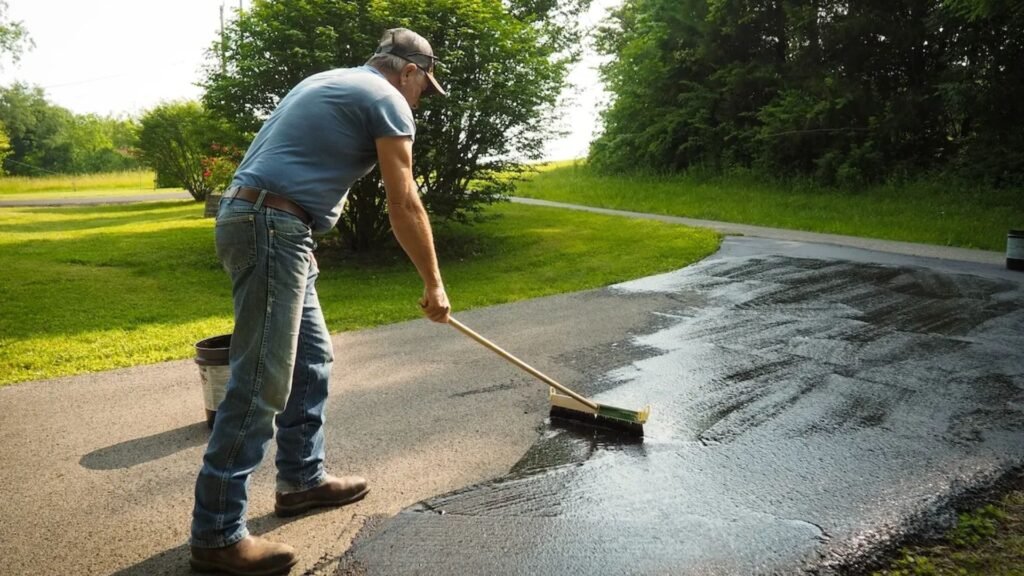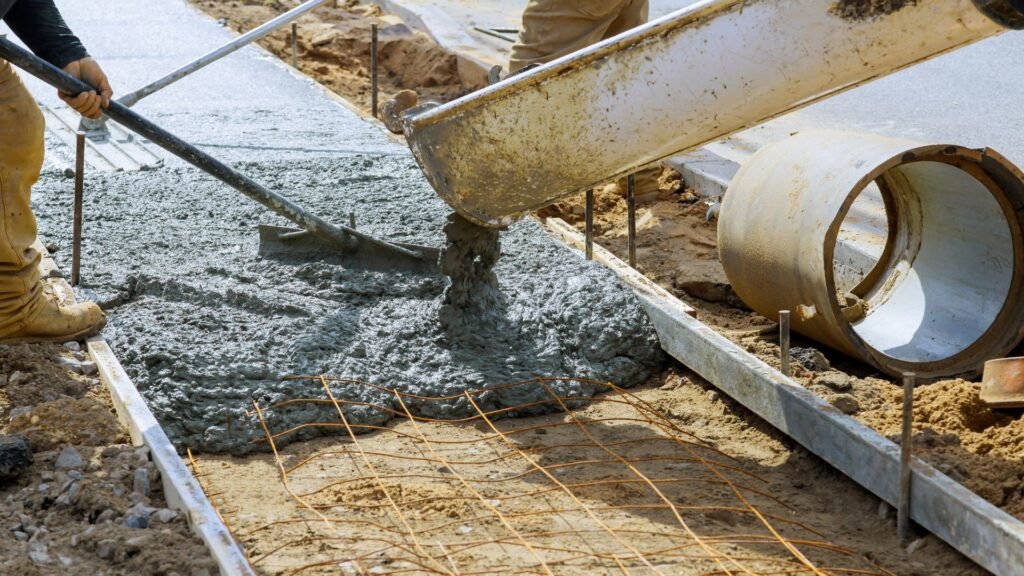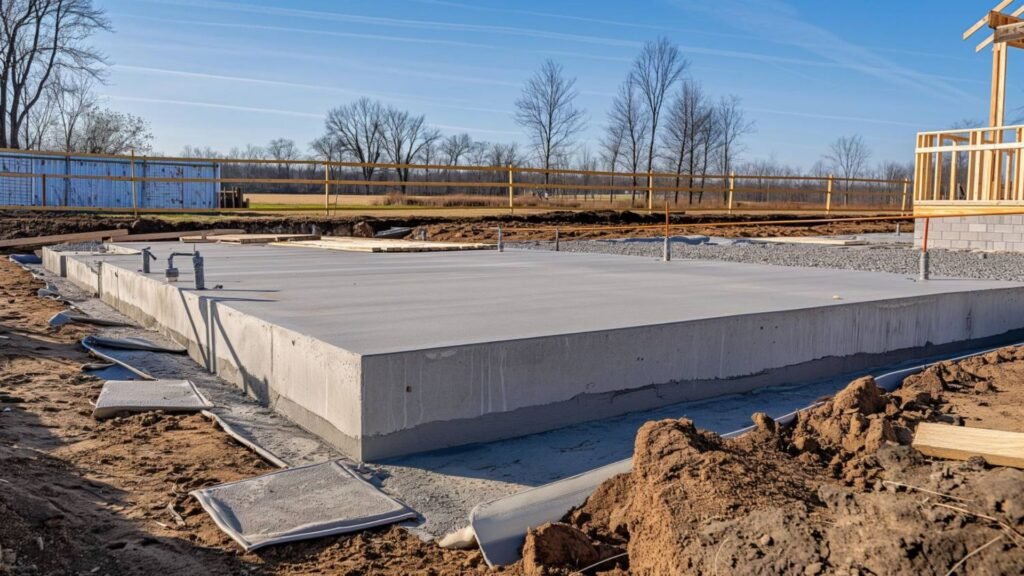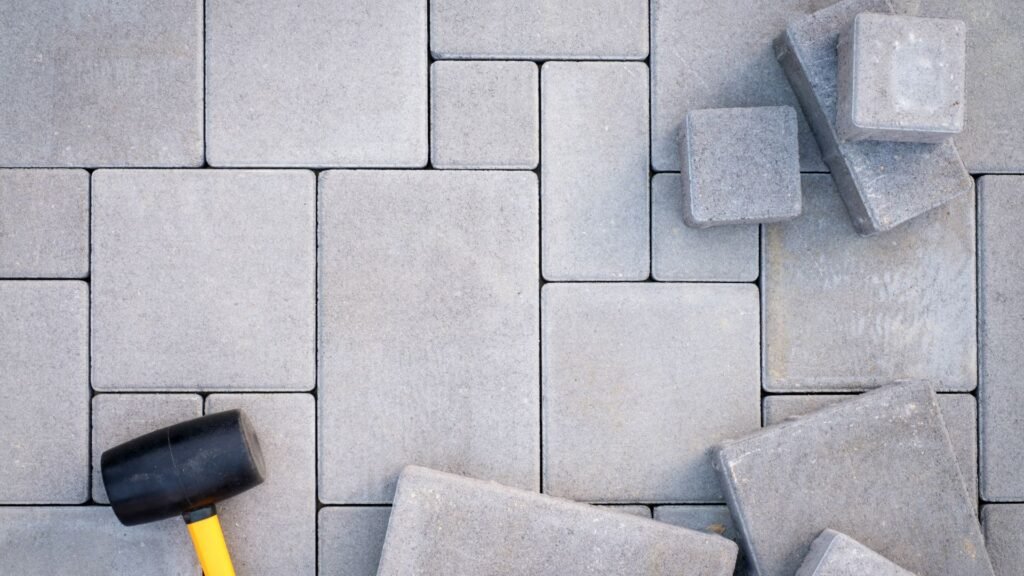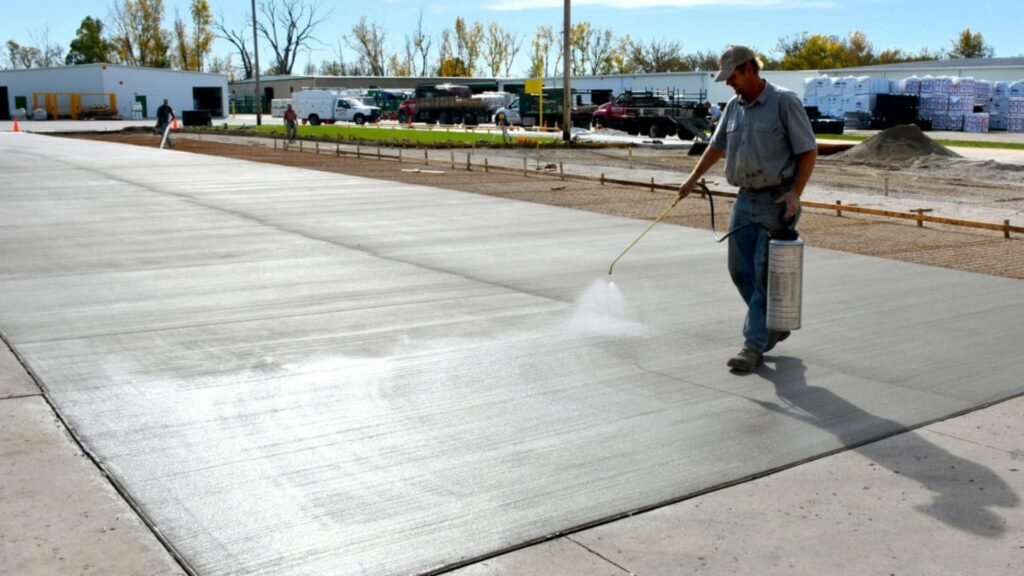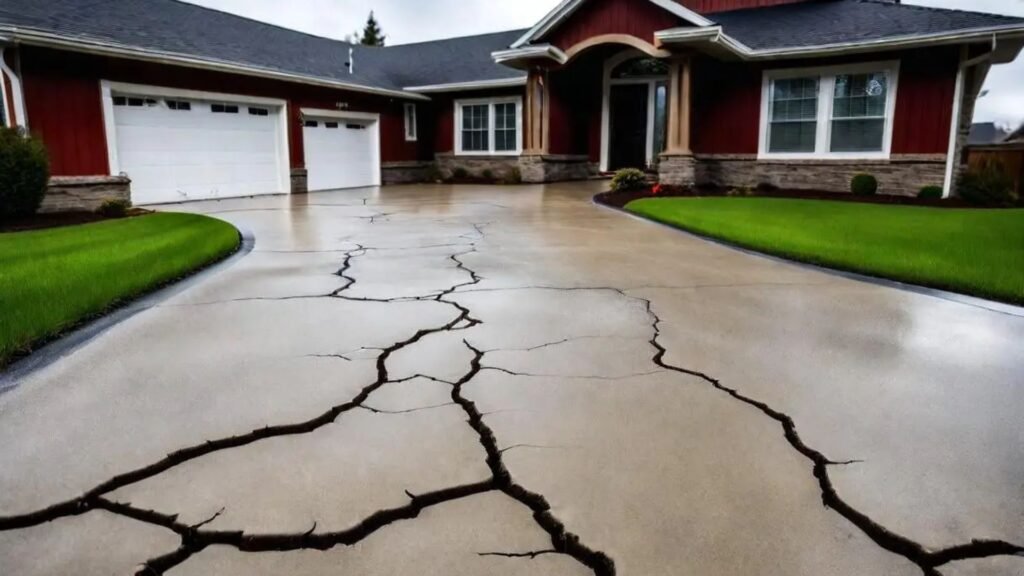Welcome to your complete guide on choosing the best type of reinforcement for residential driveways! If you’re a homeowner looking to build a new driveway or upgrade an existing one, you’ve likely realized that durability and strength are key factors to consider. Your driveway faces daily wear and tear from vehicles, weather conditions, and ground shifting, and the right reinforcement can make all the difference in how well it holds up over time. In this post, we’ll break down the most common reinforcement options, from steel rebar to fiber reinforcement, helping you make an informed decision on the best choice for your driveway’s longevity and stability.
The best type of reinforcement for residential driveways depends on factors like traffic load, climate, and budget. Steel rebar provides the most strength and durability, ideal for heavy vehicles or harsh conditions. Wire mesh offers a cost-effective alternative for lighter loads and smaller driveways. Fiber reinforcement, mixed directly into the concrete, helps prevent cracks and is easier to install, while geotextiles stabilize the foundation, especially in areas with shifting soil. Choosing the right option ensures a long-lasting, durable driveway.
Table of Contents
Why Reinforcement Is Necessary For Residential Driveways
When it comes to building a long-lasting and durable driveway, reinforcement plays an essential role. Whether you’re using concrete or asphalt, simply pouring the material is not enough to withstand the various forces that affect a driveway over time. Here’s a closer look at why reinforcement is crucial and how it ensures the longevity and strength of residential driveways.
Understanding Reinforcement
Reinforcement refers to the process of adding materials, such as steel bars (rebar) or wire mesh, into the concrete or asphalt mixture to enhance its overall strength and durability. For driveways, this is vital because it helps distribute the load of vehicles more evenly, reducing the risk of cracks or damage.
Without reinforcement, the surface is more prone to cracking due to the weight of vehicles or environmental factors like temperature fluctuations and soil movement. By adding reinforcement, you essentially create a more resilient structure that can endure everyday wear and tear.
Why Reinforcement is Crucial for Driveways
- Prevents Cracking: One of the primary benefits of reinforcement is its ability to prevent cracks, which is a common problem with non-reinforced driveways. Cracks can quickly become larger issues, leading to costly repairs or even complete replacement.
- Increases Longevity: A reinforced driveway is more likely to last for decades, especially when compared to a non-reinforced one, which may deteriorate much faster due to external stresses.
- Boosts Safety: Driveways with visible cracks and damage can create tripping hazards for pedestrians or unstable surfaces for vehicles. Reinforcement minimizes these risks by maintaining a smoother, safer surface.
The Importance of a Solid Foundation
The foundation of any driveway is just as important as the surface material itself. While many homeowners might think that simply pouring concrete or asphalt directly onto the ground is enough, this can lead to significant problems down the line. A well-prepared foundation, coupled with proper reinforcement, is key to ensuring your driveway can withstand the stresses placed upon it.
Factors Affecting Driveway Foundations:
1. Heavy Vehicles: Whether it’s regular traffic from cars or heavier vehicles like trucks or RVs, driveways are under constant pressure. Over time, this weight can cause unreinforced surfaces to shift, sag, or crack.
2. Climate Conditions: Changing temperatures can cause expansion and contraction in the materials, particularly in areas with extreme hot or cold climates. This thermal stress weakens the structure, making reinforcement crucial to prevent cracking or buckling over time.
3. Soil Movement: The soil beneath the driveway can shift due to moisture changes, freeze-thaw cycles, or even natural settling. Without a reinforced foundation, these movements can cause the driveway to shift or crack, leading to structural instability.
Why Simply Pouring Isn’t Enough
- Lack of Load Distribution: Without reinforcement, concrete and asphalt can’t distribute the weight of vehicles evenly, leading to stress points where cracks or damage are likely to occur.
- Erosion and Settlement: Soil movement or erosion over time can weaken the foundation, leading to cracking and uneven surfaces if reinforcement isn’t in place to provide extra support.
Reinforcing residential driveways is not just about adding strength—it’s about ensuring long-term durability and safety. Reinforcement helps prevent cracks, increases longevity, and maintains a solid, reliable surface despite the stresses of vehicle traffic, climate changes, and soil movement. Simply pouring concrete or asphalt without proper reinforcement may save costs upfront, but it could lead to significant repairs in the future.
For homeowners looking to invest in a driveway that will stand the test of time, proper reinforcement is a crucial step in the construction process.

Types Of Reinforcement For Driveways
When building or renovating a driveway, one of the most important factors to consider is the type of reinforcement used to strengthen the concrete. Reinforcement prevents cracking, increases durability, and ensures your driveway can handle the pressure of vehicles and changing weather conditions. This guide will explore the most common reinforcement options for residential driveways, including steel rebar, wire mesh, fiber reinforcement, and geotextiles. Let’s take a closer look at each type, evaluating the pros, cons, and ideal use cases to help you make an informed decision.
Steel Rebar
What is it?
Steel rebar, short for “reinforcing bar,” is a traditional and highly popular choice for concrete reinforcement. These steel rods are embedded into the concrete to provide added strength and durability, making them essential for driveways that experience heavy loads or frequent use.
How It Works
Steel rebar enhances the structural integrity of concrete by distributing loads evenly and preventing cracks. When concrete undergoes stress due to traffic or natural elements, the rebar helps to absorb the tension and compression forces that concrete alone cannot handle. This makes it highly effective in preventing cracking and breaking over time.
Pros:
- Offers exceptional strength and durability.
- Ideal for high-traffic areas and driveways that support heavy vehicles, such as trucks or RVs.
- Resistant to wear and tear in extreme weather conditions, including freezing and thawing cycles.
Cons:
- Can be more expensive than other reinforcement options.
- Installation requires professional expertise due to the precise placement of rebar within the concrete.
- Susceptible to rust if exposed to moisture, leading to long-term degradation if not properly treated or maintained.
Ideal for:
Steel rebar is perfect for long driveways, high-traffic areas, or homes where the soil tends to shift or freeze frequently. It’s also the go-to option for homeowners looking for maximum durability, especially if the driveway will endure heavy loads regularly.
Wire Mesh (Welded Wire Fabric)
What is it?
Wire mesh, also known as welded wire fabric, consists of thin steel wires arranged in a grid-like pattern. It’s a cost-effective and widely-used alternative to steel rebar for reinforcing concrete in residential driveways.
How It Works
The wire mesh holds the concrete together by providing a framework that reduces cracking. Although it may not be as strong as rebar, it distributes stress across the surface of the concrete, which helps prevent large cracks from forming.
Pros:
- Easier and quicker to install compared to rebar, making it a more efficient option for smaller projects.
- More affordable, making it attractive for homeowners on a budget.
- Provides sufficient reinforcement for light to medium traffic driveways.
Cons:
- Not as durable or strong as rebar, making it less suitable for driveways that endure heavy loads.
- Less effective in areas where soil shifting is common or where freezing and thawing occur regularly.
Ideal for:
Wire mesh is ideal for shorter driveways, or for homeowners who expect light to moderate traffic. It’s an excellent option for those who want an affordable yet reliable reinforcement solution, particularly in residential settings with smaller vehicles.
Fiber Reinforcement
What is it?
Fiber-reinforced concrete is a modern approach to concrete reinforcement that involves mixing tiny fibers—either synthetic or steel—into the concrete. This method is gaining popularity as an alternative to traditional steel reinforcement due to its ease of use and added durability.
How It Works
The fibers, when mixed into the concrete, distribute stress throughout the slab, reducing cracking and increasing the overall toughness of the concrete. These fibers enhance the concrete’s ability to withstand small cracks and surface wear without needing additional materials like rebar or mesh.
Pros:
- Quick and easy installation, as the fibers are mixed directly into the concrete, eliminating the need for manual reinforcement placement.
- No risk of corrosion, making it a durable option for areas with high moisture levels.
- Increases the surface toughness of the concrete, reducing the formation of small cracks over time.
Cons:
- May not provide the same level of strength as rebar or wire mesh, especially in driveways that support heavy traffic or larger vehicles.
- Not ideal for high-load applications, limiting its use in certain driveway setups.
Ideal for:
Fiber reinforcement is best suited for driveways that experience light to moderate traffic, particularly in areas with stable soil conditions and moderate climates. It’s a great option for homeowners who want an easy-to-install solution that reduces cracking without the need for extensive labor or maintenance.
Geotextiles
What is it?
Geotextiles are fabric-like materials typically placed under the concrete or gravel layers of a driveway. While they don’t reinforce the concrete directly, they help to stabilize the ground, reduce soil movement, and prevent erosion, ultimately improving the overall strength of the driveway’s foundation.
How It Works
Geotextiles work by stabilizing the soil beneath the driveway, preventing shifting and settlement that could lead to cracks in the concrete above. They also improve water drainage, which helps maintain the integrity of the driveway over time.
Pros:
- Provides excellent base support, especially in areas prone to soil movement or erosion.
- Cost-effective, making it an affordable solution for reinforcing the foundation of the driveway.
- Helps prevent long-term damage by stabilizing the soil and improving drainage.
Cons:
- Does not provide direct reinforcement to the concrete like rebar or wire mesh, meaning it won’t prevent cracks from heavy loads.
- Not suitable as a standalone solution for driveways that endure significant traffic or weight.
Ideal for:
Geotextiles are perfect for driveways in areas with poor soil conditions, water retention problems, or where the ground is prone to shifting. If your driveway is situated on unstable terrain, this is an excellent option for creating a strong, durable foundation that supports the concrete surface above.
Choosing the right type of reinforcement for your driveway depends on factors like traffic levels, soil conditions, and your budget. Steel rebar offers maximum strength, while wire mesh provides an affordable, easy-to-install alternative for lighter loads. Fiber reinforcement is great for moderate climates with minimal traffic, and geotextiles can stabilize problematic soil without adding significant cost. By carefully considering your driveway’s specific needs, you can select the best reinforcement option to ensure it lasts for years to come.
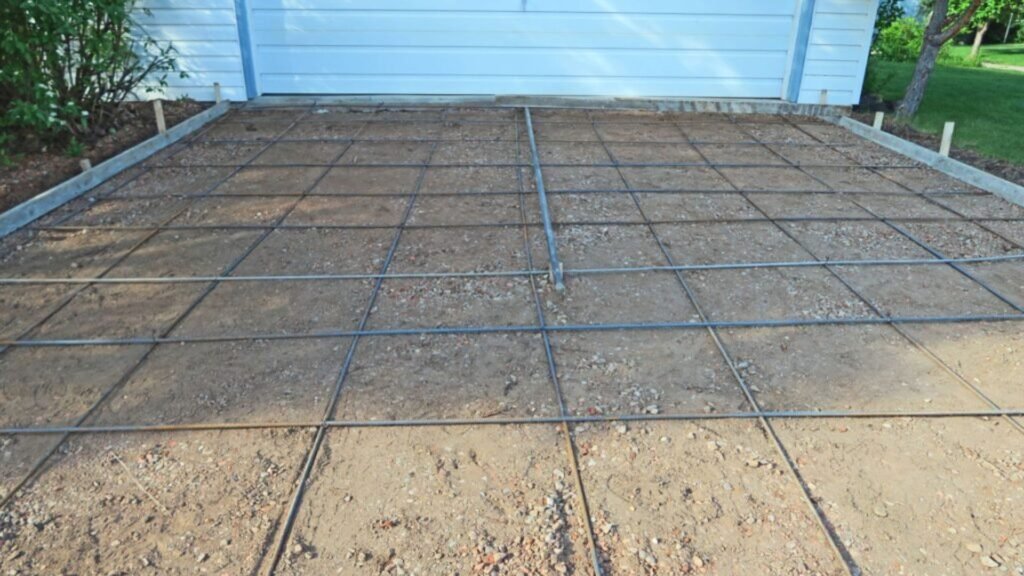
Factors To Consider When Choosing Reinforcement For Your Driveway
When it comes to ensuring the longevity and durability of your driveway, selecting the right type of reinforcement is essential. A well-reinforced driveway can withstand the test of time, resist environmental pressures, and handle the load of daily use. But how do you determine the best reinforcement option? Below are five critical factors to consider when making this decision.
1. Traffic and Load
The amount and type of traffic that your driveway will support is one of the most important factors to consider. Are you planning for regular car usage, or will your driveway need to handle heavier vehicles like delivery trucks or RVs? Light cars create minimal stress on driveways, allowing for less intensive reinforcement, while heavy vehicles can lead to quicker wear and tear. For driveways exposed to frequent heavy loads, you’ll need more substantial reinforcement, such as rebar or steel mesh, to maintain the integrity of the surface and prevent cracking or sinking.
2. Climate
The local climate is another crucial factor that impacts the longevity of your driveway. For example, regions that experience frequent freeze-thaw cycles can cause significant damage to driveways, especially if not properly reinforced. This cycle can lead to cracks and breaks as the water within the ground expands and contracts. Similarly, extremely high temperatures can cause the driveway material to expand, leading to potential surface distortion. In areas with heavy rainfall, water can seep into cracks, further weakening the driveway structure.
The right reinforcement helps mitigate the effects of harsh weather conditions. Concrete driveways in colder climates may benefit from the use of rebar or fiberglass reinforcement to resist cracking caused by freeze-thaw cycles, while in warmer regions, properly reinforced asphalt can handle the effects of expansion due to heat.
3. Soil Conditions
The type of soil beneath your driveway plays a significant role in how well it holds up over time. Different soil compositions, such as clay, sand, or loam, have varying effects on driveway stability. For instance, soils with a high clay content can retain moisture, which can lead to swelling and contraction, weakening the driveway’s foundation. Sandy soils, on the other hand, may shift easily, causing unevenness in the driveway.
In areas with poor soil conditions, choosing robust reinforcement options like rebar or heavy-duty geogrids can help maintain the driveway’s structure by distributing loads more evenly and preventing sinking or cracking. In contrast, driveways built on stable, well-drained soil might not need as intensive reinforcement.
4. Budget
Budget constraints are a significant factor when selecting driveway reinforcement. While higher-quality reinforcement options, such as steel rebar or advanced fiber reinforcements, may have higher upfront costs, they often save money in the long run by reducing maintenance and repair needs. On the other hand, more cost-effective options, like wire mesh or light reinforcements, may fit within tighter budgets but could require more frequent repairs or even replacement over time.
When planning your driveway, consider both the upfront and long-term costs. Investing in better reinforcement now may reduce the frequency and severity of repairs, ultimately saving money over the driveway’s lifespan.
5. Professional vs. DIY Installation
Finally, it’s important to consider whether you plan to install the driveway reinforcement yourself or hire a professional. Some types of reinforcements, such as simple wire mesh or lighter reinforcements, can be more accessible for DIY projects, particularly for those with some experience in home improvement. However, more complex reinforcements, like steel rebar, may require professional installation due to the precision and expertise needed to ensure they are laid correctly.
Hiring a professional ensures the job is done right, particularly if your driveway will be subject to heavy traffic or challenging soil conditions. Professionals will have the experience and tools necessary to install more complex reinforcements, providing peace of mind that the driveway will be durable and long-lasting.

Comparing Reinforcement Options For Residential Driveways
Selecting the right reinforcement material for a residential driveway is essential to ensure it remains durable, cost-effective, and easy to install. Each reinforcement option—whether it’s steel rebar, wire mesh, fiber reinforcement, or geotextiles—comes with unique benefits and drawbacks. Below, we’ll break down each option to help you make an informed choice based on your specific needs.
1. Steel Rebar
Steel rebar is one of the most durable options for driveway reinforcement. It offers high tensile strength, which is ideal for driveways that will bear heavy loads or experience frequent traffic. While steel rebar is extremely strong, it comes with a higher price tag and requires complex installation. Typically, you’ll need professional help to ensure the rebar is placed correctly within the concrete, but the long-term durability makes it worth the investment if you need a driveway built to last.
- Cost: Expensive
- Durability: High
- Ease of Installation: Complex
- Best For: Driveways that need to support heavy vehicles or endure long-term use.
2. Wire Mesh
Wire mesh is a popular middle-ground option when it comes to balancing cost and durability. It’s more affordable than steel rebar and easier to install, making it a go-to choice for homeowners looking for general-purpose driveway reinforcement. Wire mesh helps distribute weight evenly across the concrete and reduces the likelihood of cracks forming. Installation is simpler compared to rebar, although still requires proper placement for best results.
- Cost: Moderately priced
- Durability: Moderate
- Ease of Installation: Easier than rebar
- Best For: General driveways that don’t need heavy-duty reinforcement but still require crack prevention.
3. Fiber Reinforcement
Fiber reinforcement involves mixing synthetic fibers directly into the concrete, creating a reinforced composite that helps prevent surface cracking. It is one of the simplest and most cost-effective reinforcement options, especially for smaller driveways. However, fiber reinforcement doesn’t provide the structural strength that wire mesh or steel rebar offers. It’s best suited for areas that won’t be subjected to heavy traffic or weight.
- Cost: Moderately priced
- Durability: Moderate
- Ease of Installation: Very simple
- Best For: Smaller or lightly trafficked driveways where controlling surface cracks is the primary goal.
4. Geotextiles
Geotextiles are fabric-like materials placed under the driveway’s surface to improve base stability and prevent soil erosion. They are not used as the main reinforcement but act as a supplemental layer that helps strengthen the ground beneath the concrete. Geotextiles are affordable and incredibly easy to install, often used in conjunction with other reinforcement options to add an extra level of stability.
- Cost: Affordable
- Durability: Provides base stability
- Ease of Installation: Very easy
- Best For: Supporting the base layer of the driveway and preventing soil movement, especially when combined with other reinforcements.
Finding the Right Reinforcement for Your Driveway
The best reinforcement material for your driveway depends on your specific needs. If you require maximum strength for heavy vehicles, steel rebar is your best option, though it’s costly and requires professional installation. Wire mesh offers a balance between cost and durability, making it ideal for most residential driveways. For those looking for an economical solution, fiber reinforcement can help prevent cracks, while geotextiles provide essential base support when used alongside other materials.
By carefully considering the pros and cons of each option, you can make a choice that fits your budget, installation skills, and long-term needs for your driveway.
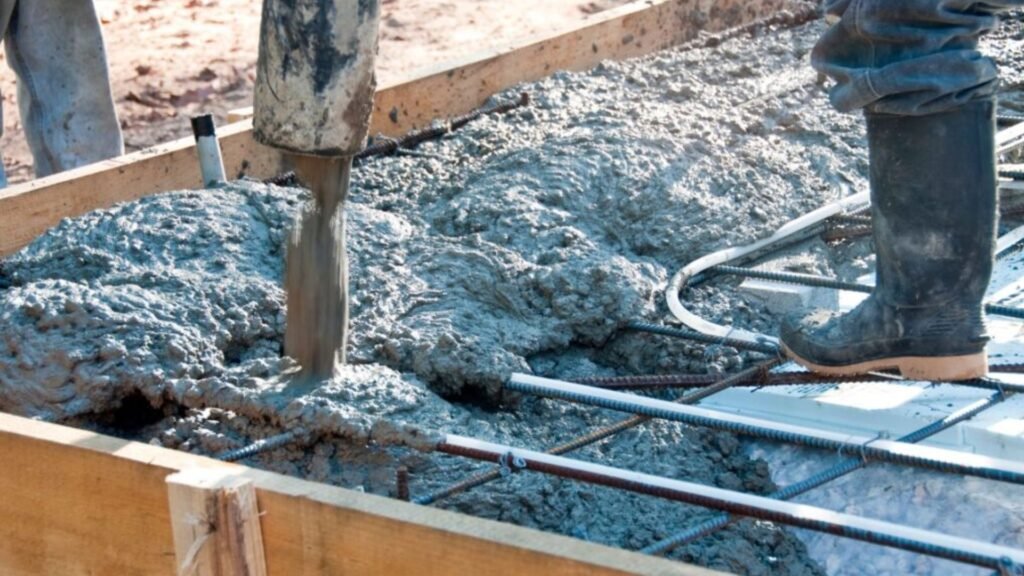
Maintenance Tips For Reinforced Driveways
Regular Maintenance
To keep your reinforced driveway in optimal condition and extend its lifespan, regular maintenance is essential. The durability of reinforced concrete or asphalt driveways depends heavily on how well they are cared for over the years.
- Sealing the surface is one of the best ways to protect your driveway from water infiltration, which can cause cracking, erosion, and weakening over time. For concrete driveways, it’s recommended to seal them every 2-3 years, while asphalt driveways benefit from sealing every 1-2 years. This layer acts as a barrier against oil spills, chemicals, and the wear and tear caused by vehicles.
- Cleaning is another crucial aspect of driveway care. Dirt, debris, and stains can wear down the surface if left unchecked. Regularly sweep your driveway and clean any spills or stains immediately with a mild detergent and water. For tougher stains like oil, use a degreaser to break down the substance and avoid permanent discoloration or damage.
Additionally, make sure to perform crack repairs as soon as they appear. Small cracks may seem insignificant, but over time, they can grow larger and compromise the integrity of the driveway. Fill in these cracks with a crack filler specifically designed for asphalt or concrete to prevent water from seeping in and causing further damage.
Seasonal Care
Caring for your driveway through the seasons is vital, especially in areas with extreme weather conditions. Different seasons present unique challenges that can impact the condition of your driveway.
- In winter, freezing temperatures can cause expansion and contraction of the materials, leading to cracks. It’s important to clear snow and ice from your driveway using a plastic shovel to avoid scratching the surface. Avoid using harsh deicing chemicals, as they can erode the driveway material. Instead, opt for sand or cat litter to add traction without causing damage.
- During spring and summer, heavy rain can also affect the driveway’s surface, especially if water pools in certain areas. Ensure your driveway has proper drainage to avoid standing water, which can cause cracks or erosion over time. During the dry summer months, avoid parking heavy vehicles in the same spot for extended periods, as heat can soften asphalt driveways, leading to indentations.
- In autumn, falling leaves and other debris can trap moisture against the surface, leading to discoloration and eventual damage. Make it a habit to regularly clear away leaves and branches to maintain the driveway’s appearance and structural integrity.
How to Spot Issues Early
Being proactive about spotting signs of wear and damage can save you money and effort in the long run. Here’s what to watch out for:
- Small Cracks: These are the most obvious early indicators that your driveway needs attention. While tiny hairline cracks may not seem like a big deal, they can widen quickly due to water infiltration, leading to more serious problems.
- Shifting or Uneven Areas: If you notice areas of the driveway that are uneven or appear to be sinking, this could indicate that the foundation beneath is shifting. Addressing these issues early can prevent more extensive repairs down the road.
- Discoloration or Stains: While stains from oil or chemicals may seem purely cosmetic, they can signal that the protective sealant is wearing off. Once the sealant is compromised, your driveway becomes more susceptible to weather damage.
- Potholes: Small depressions can form over time and will only worsen if left unattended. Fixing them early ensures that the surface remains even and safe for both foot and vehicle traffic.
By staying on top of these early warning signs, homeowners can maintain the beauty and functionality of their reinforced driveways, ensuring they remain a valuable part of the property for years to come.
By integrating these driveway maintenance tips into your routine, you can enjoy a driveway that not only looks great but also performs well, even in the harshest of climates. With proper care and attention, your reinforced driveway can last for decades, reducing the need for costly repairs or replacements.

Real-World Examples And Testimonials
When it comes to choosing the right reinforcement materials for your home, real-world examples and testimonials can be the key to making informed decisions. Homeowners often feel reassured by the experiences of others who have faced similar challenges and come out with lasting solutions. In this section, we’ll delve into a real case study and a homeowner testimonial, demonstrating the effectiveness of reinforcement materials like steel rebar.
Case Study: The Durability of Steel Rebar in a Cold Climate
Imagine a homeowner in northern Minnesota, where winter temperatures regularly plunge below freezing, causing significant stress to building materials. Ten years ago, this homeowner decided to renovate their basement using reinforced concrete with steel rebar. The goal was to ensure the structural integrity of the foundation, even in the face of extreme temperature fluctuations and frost heaving.
After a decade, the results are impressive. Despite experiencing multiple harsh winters, the basement has shown no signs of cracking or shifting. The steel rebar, known for its excellent tensile strength, has provided the necessary support to withstand the freeze-thaw cycles common in cold climates. The homeowner credits the longevity of their basement structure to the strategic use of steel rebar reinforcement, stating that without it, they would have faced costly repairs by now.
This case study highlights how selecting the right reinforcement materials can result in long-term stability and peace of mind for homeowners in challenging environments.
Customer Testimonial: Reinforcement that Stands the Test of Time
“After moving into our home in a hurricane-prone region, my wife and I were concerned about the durability of our foundation. We decided to invest in reinforced concrete using high-quality steel rebar to ensure that our house could weather any storm. Five years later, after enduring two major hurricanes, our home still stands strong with no visible damage to the foundation. I can’t imagine what we would have done without this reinforcement. It’s been worth every penny knowing that our home is safe and secure.”-Mark J., Florida
Mark’s testimonial adds a human element to the discussion, illustrating the practical benefits of choosing durable reinforcement materials. Homeowners like Mark gain confidence in their investment, knowing that their decision to use high-quality reinforcement can provide safety and stability for years to come.
Through real-world examples and personal testimonials, it becomes evident that the right reinforcement materials are critical for ensuring the long-term durability and safety of any structure. Whether you’re in a cold climate or a hurricane-prone area, reinforcement materials like steel rebar can make all the difference in protecting your home for the future.
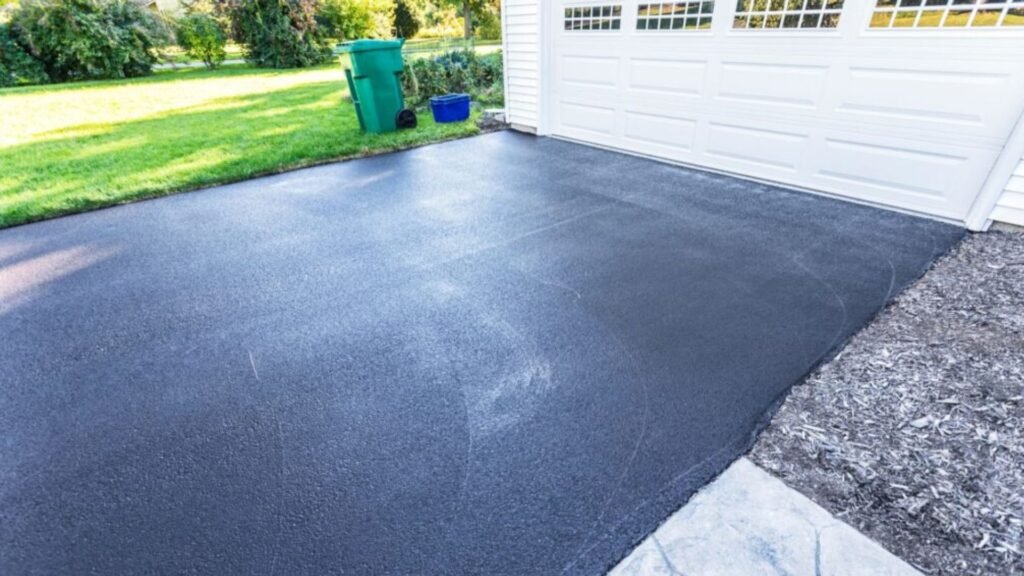
FAQs: About Which Type Of Reinforcement Is Best For Residential Driveways?
What is the best type of reinforcement for residential driveways?
The best type of reinforcement depends on your driveway’s needs. Steel rebar offers the highest durability, especially for heavy-duty use. Wire mesh is more cost-effective for lighter traffic, while fiber reinforcement is great for crack prevention and easy installation. Geotextiles work well for stabilizing the base in areas with poor soil.
How does steel rebar reinforce a driveway?
Steel rebar strengthens concrete by distributing the weight and preventing cracks. It is embedded within the concrete and helps hold it together under pressure, making it ideal for driveways that experience heavy loads or shifting ground.
Is wire mesh a good option for residential driveways?
Wire mesh is a good option for residential driveways that see lighter traffic. It is easier to install than steel rebar and offers decent reinforcement for preventing cracks. However, it may not be as durable for heavy loads or high-traffic areas.
What is fiber reinforcement, and how does it work in driveways?
Fiber reinforcement involves mixing small synthetic or steel fibers directly into the concrete. These fibers help distribute stress across the surface, reducing the likelihood of cracks. Fiber reinforcement is a simple, effective option for light to medium traffic driveways.
Can I install driveway reinforcement myself?
Some types of reinforcement, like fiber reinforcement, can be DIY-friendly, as it involves mixing fibers into the concrete. However, steel rebar and wire mesh often require professional installation to ensure proper placement and effectiveness.
How does climate affect the choice of driveway reinforcement?
In climates with freeze-thaw cycles or extreme heat, driveways are more prone to cracking. Steel rebar and fiber reinforcement are better suited for handling such conditions, while geotextiles can help prevent soil movement in areas with frequent temperature changes or heavy rainfall.
Is driveway reinforcement necessary for all driveways?
While not mandatory, reinforcement is highly recommended for most driveways to prevent cracking, improve durability, and handle various stressors such as vehicle loads and shifting ground. Reinforcement is especially important for concrete driveways.
How does geotextile reinforcement work?
Geotextiles are fabric-like materials placed under the driveway surface to stabilize the soil and reduce shifting. They don’t reinforce the concrete directly, but they provide essential base support, making them ideal for areas with poor or unstable soil conditions.
How much does it cost to reinforce a driveway?
The cost of reinforcing a driveway varies depending on the type of reinforcement used. Steel rebar tends to be the most expensive due to material and labor costs, while wire mesh and fiber reinforcement are more affordable options. Geotextiles are cost-effective for stabilizing the base.
How can I maintain a reinforced driveway?
Maintaining a reinforced driveway involves regular cleaning, sealing to protect the surface, and repairing small cracks as they appear. Seasonal care, like shoveling snow carefully in winter or protecting the surface from heat in summer, can also extend the driveway’s lifespan.
Conclusion
In conclusion, selecting the right type of reinforcement for your residential driveway is crucial to ensuring its durability and longevity. Each home has unique requirements based on factors like climate, soil condition, and the expected load on the driveway. Taking the time to evaluate these elements will help you make an informed decision that can save you from costly repairs in the future. Whether you’re installing a new driveway or looking to reinforce an existing one, it’s important to consult with a professional contractor or continue your research to find the best solution. Need guidance? Reach out to a local expert today to discuss the optimal reinforcement for your home.
About the Author:
Mike Veail is a recognized digital marketing expert with over 6 years of experience in helping tradespeople and small businesses thrive online. A former quantity surveyor, Mike combines deep industry knowledge with hands-on expertise in SEO and Google Ads. His marketing strategies are tailored to the specific needs of the trades sector, helping businesses increase visibility and generate more leads through proven, ethical methods.
Mike has successfully partnered with numerous companies, establishing a track record of delivering measurable results. His work has been featured across various platforms that showcase his expertise in lead generation and online marketing for the trades sector.
Learn more about Mike's experience and services at https://theleadguy.online or follow him on social media:
